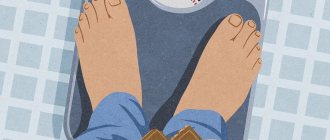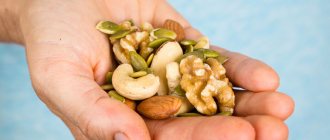Have you been on a strict diet for so long that you can’t remember exactly when you started? Have you cut your calorie intake to a minimum to overcome the plateau effect? If you answered “yes” to at least one of the two questions listed, then most likely you need to do a loading day.
Is it necessary to do a loading day in a diet when losing weight?
Have you been on a strict diet for so long that you can’t remember exactly when you started? Have you cut your calorie intake to a minimum to overcome the plateau effect? If you answered “yes” to at least one of the two questions listed, then most likely you need to do a loading day.
If you have experience losing weight, then you've probably experienced a plateau effect or even a slight weight gain. This body reaction usually occurs after several weeks or months of dieting.
Weight loss may slow down every week until the scale needle freezes in place. Reason and science at times like these say we should move forward with a calorie deficit to speed up our goal.
However, science also suggests temporarily “fooling” our body, which has just adapted to a calorie deficit diet.
Why does weight loss stop?
The diet minimizes leptin, triiodothyronine (T3) and thyroxine (T4) levels while increasing cortisol levels. Leptin suppresses hunger, T3 and T4 increase basal metabolic rate, and cortisol increases blood sugar and accelerates protein breakdown.
The human body, in the process of evolution, has learned to preserve fat deposits through the loss of muscle mass. The trick is to reverse these negative processes by tricking your body into thinking you are no longer calorie restricted.
What is a loading day?
A loading day is a special part of the carbohydrate cycling strategy. Instead of high carb days, medium carb days, and low carb days, you have normal carb days and loading days.
By increasing your carbohydrate intake, you increase leptin levels and energy expenditure. With increased consumption of carbohydrates, the release of the hormone insulin into the blood increases, which is useful as a substance that suppresses the breakdown of protein in muscles, as well as stimulating the production of testosterone (in men).
Loading days are especially important for women because if leptin levels are not high enough, menstruation may stop. That is, loading helps maintain longevity and health.
The frequency of loading days and the percentage of excess carbohydrates consumed on these days depend on many factors:
- Duration of the diet;
- Level of calorie and carbohydrate deficit;
- Body fat percentage;
- Genetics;
- Physical activity.
Typically, the more you limit your carbohydrate intake on diet days, the more carbohydrates you need to consume on loading days.
Increasing your fat intake on a fasting day interferes with the rise in leptin levels.
How to do it?
How to cheat? There are some rules on which your success and results will depend:
- You shouldn’t have “loading” days too often. Once a week is enough. But if you endure longer, cheat less often. In general, focus on your condition and the severity of the diet you are following (if you are following a diet that is too strict, you can do “loads” more often).
- The duration may also vary. For some, one day is enough, for others, two days are enough. But if you go on such a kind of food “binge” for three days or even more, then don’t expect weight loss, nothing will happen.
- Let's look at the menu. In principle, almost anything is possible, because this is a “download”. And yet it is worth giving up the so-called simple carbohydrates contained in cakes, pastries, processed foods, fast food and other “harmful” foods. If you really want all this, then it is best to consume such products in the first half of the day. Still, it is advisable to prefer complex carbohydrates, which are spent on energy rather than stored. They are found in nuts, muesli, and cereals. Also eat vegetables, meat, fruits, berries, seafood, and fish.
- As for the amount of food consumed, you should not overeat. Eat until you feel full, and not until you feel heavy and “full.” And it’s best to eat less forbidden foods than dietary ones.
- Now about daily caloric intake. It will depend on the number of calories consumed in one day of the diet, on the duration of cheating, as well as on physical activity. So, if you plan to “load” one day while lying on the couch, then increase your daily calorie intake by 500-700. On an active working day, the increase can be 1000-1500 calories. If you plan to stretch cheating over two days, increase the daily rate by 10-20%. If you eat 1000 calories a day on a diet, then doubling it will be optimal. But if the daily requirement is 2000 calories, then add no more than 500 calories during the cheating period.
- Stick to this ratio: 70% of the food is everything the body needs (that is, healthy food), and 30% is everything you dreamed of.
Lose weight effectively, correctly and with pleasure. Cheating will help you with this.
The benefits of loading days
Loading days will make the difficult struggle with excess weight easier. Staying in a caloric deficit for long periods of time is exhausting (even though it helps you live longer).
Sometimes increasing your daily calories, especially from carbohydrates, can:
1. Reduce hunger! Not only due to the consumption of more food, but also due to an increase in the level of leptin - the “satiety hormone”.
2. Increase energy expenditure despite the calorie deficit. Our body reduces energy expenditure when reducing energy intake. Increasing your carbohydrate intake from time to time will help increase your energy expenditure even when following a long-term diet.
3. Make Dieting Easier: It's much easier to stay in a calorie deficit if you know you can eat more on certain days. This approach to losing weight is much more effective in helping to avoid breakdowns and gluttony. It also allows (if urgently needed) to enjoy consuming your favorite product/dish.
4. Liven up your diet with more carbohydrates, making it more tolerable.
5. Avoid a breakdown: it is difficult to maintain a calorie deficit for a long time. Almost the entire period of following a diet during “drying” a person experiences stress. Therefore, breakdowns very often occur: as soon as the goal of the diet is achieved, the person begins to eat everything. Loading days will make the exit from the diet smoother, without breakdowns.
6. Increase energy consumption and labor productivity. Rapid fat burning occurs with the loss of a small percentage of muscle. You need to constantly fight for their safety and strive for their growth while following a diet. Increased consumption of carbohydrates, which occurs rarely but periodically, allows you to replenish glycogen in the muscles, and therefore preserve muscle tissue.
How to make cheating work for you?
- If during the period when you are on a diet, some festive events are expected (weddings, birthdays), when drawing up a plan for loading days, schedule them for these dates. Such planning will allow you not to feel like a black sheep at the holiday and delight yourself with delicious forbidden foods. However, do not turn pleasure into gluttony!
- Some nutritionists recommend combining cheating with the date of your workout. This will help you immediately burn some of the calories you eat. In addition, many people prefer not to overeat before playing sports, but after them to eat healthier foods.
- Drink plenty of water. This will help “deceive” hunger. After all, people often confuse hunger with thirst. Sometimes you just drink a glass of water and you don’t feel like eating anymore!
- It is perfectly acceptable to consume prohibited foods, but even here some sense of proportion is needed. Would you like some cake? Eat one (or maybe even 2). But you don’t have to overeat eclairs to the point of nausea.
- Don't load up on food. Remember to chew your food thoroughly and enjoy every bite. This will make your meal tastier and healthier. Plus, you'll likely feel full much faster.
- Don't give in to guilt. In no case do not scold yourself for every piece you eat on the day of cheating. “Loading” should charge you with energy for further achievements in losing weight and improving your figure, and in no way make you feel remorse.
On cheat days, enjoy your food! That's exactly what they are designed for. Only then will the loading period be beneficial.
What is cheating?
Cheat meals and cheat days should be considered a specific type of loading. Cheating is also about consuming more calories, but with psychological benefits.
Eating a hamburger, fries, and ice cream (especially if you eat it last) can make you very happy. But do not forget that cheat meals and loading days have completely different meanings from the point of view of physiological benefits. After all, the ratio of macroelements (proteins, fats, carbohydrates) in them is fundamentally different.
Cons of cheat days
The fragile boundaries of dietary freedom and self-control can break, and instead of benefit, you will only get disappointment from cheating on your diet. What dangers await you?
- Permissiveness in food can “break the roof”, and you will not be able to return to your previous diet the next day after cheating. How to avoid this? Cultivate willpower and fortitude!
- If you take the idea of cheating incorrectly, then you can eat as many calories in 1 day as you will then lose until the next loading day. And this is a vicious circle! What to do? Do not confuse the period of indulgence with the day of gluttony!
Are there other approaches to carb and calorie cycling?
There are several other approaches to calorie cycling. Some of them, such as the traditional one, are similar to downloading. Others are based on completely opposite principles.
For example, consume the physiological norm of calories all week and make 1-2 days low-calorie. The approach is based on a principle similar to loading, which makes the diet more bearable, because there are “fed” breaks between “hungry” days. But hormone levels differ and affect body changes differently.
This approach works flawlessly even taking into account the adaptive metabolic mechanism.
What's the point?
The human body easily adapts to any diet, as a result of which weight loss slows down. Loading will help speed up your weight loss process again by temporarily increasing your carbohydrate intake. This approach will make the diet easier and livelier, making it more bearable and ensuring a smooth transition to a higher calorie diet at the end of the diet due to the absence of excessive hunger and food cravings.
If loading negatively affects any of the factors described above, it may not be worth using. But the cumulative effect of loading days makes the method a very powerful fat burning tool.
Research on the effects of loading is limited and difficult to generalize, and there are many approaches to application. Loading can be used successfully by increasing carbohydrate intake by either 50% or 100%. You can also reduce/increase the amount of fat consumed, depending on metabolism and the body’s response to diet changes.
Cheating: an effective way to deceive excess weight
Indeed, often it is not you, or rather, not all of you, who are to blame, but the mechanisms regulating ovulation.
It is so designed by nature that in order to form a full-fledged corpus luteum, the female body needs fats, and carbohydrates to maintain the optimal energy level of the process. It is this ancient call that makes us reach for the coveted forbidden bag of French fries, completely forgetting about the dream bikini and weeks of weight loss efforts.
Moreover, in reality, the body does not need kilograms of oiled potatoes, but, say, one additional egg yolk on the decisive day of the cycle is enough. However, if you are on a restrictive diet or experience hormonal imbalance, the process gets out of control, and you have to prepare for either the hellish torment of cravings for forbidden foods or the feeling of guilt due to relapse and overeating.
It is also common to feel a sucking emptiness in the stomach due to stress and lack of sleep, seasonal affective disorder (caused by lack of sun) and even gastritis and stomach ulcers.
Therefore, before you decide that a gastronomic “indulgence” in the form of cheating will allow you to better control yourself and lose weight, it is a good idea to at least see an endocrinologist and gastroenterologist.
An endocrinologist may also help you cope with the “plateau stage,” the nightmare of those who decide to lose weight. “Plateau” in one form or another is a side effect of almost any long-term diet. The reasons why the initially enthusiastically melted weight freezes at a dead point, or even begins to grow again against the backdrop of a meager menu and even intense physical exercise, are not at all mystical. Again, the responsibility lies with hormones that regulate cellular metabolism and manage fat reserves. Realizing that the recent menu is noticeably more modest than usual, and the accumulated fat is being used up, they decide that the “housewife” is in trouble and not only block the use of fat reserves, but with all their might they create new ones.
It is assumed that cheating deceives precisely this process: a well-timed “sip” in the form of a change in nutrition plan (for example, from protein to carbohydrate) or an increase in daily calorie intake lulls the vigilance of hormones.
They decide that the trouble is over, the body is fed again, and they can part with the fat. As soon as the metabolism senses a catch and gets ready to lock the bins again, a new cheating day will arrive. This is how supporters of “diet cheating” who fear a “plateau” argue.










